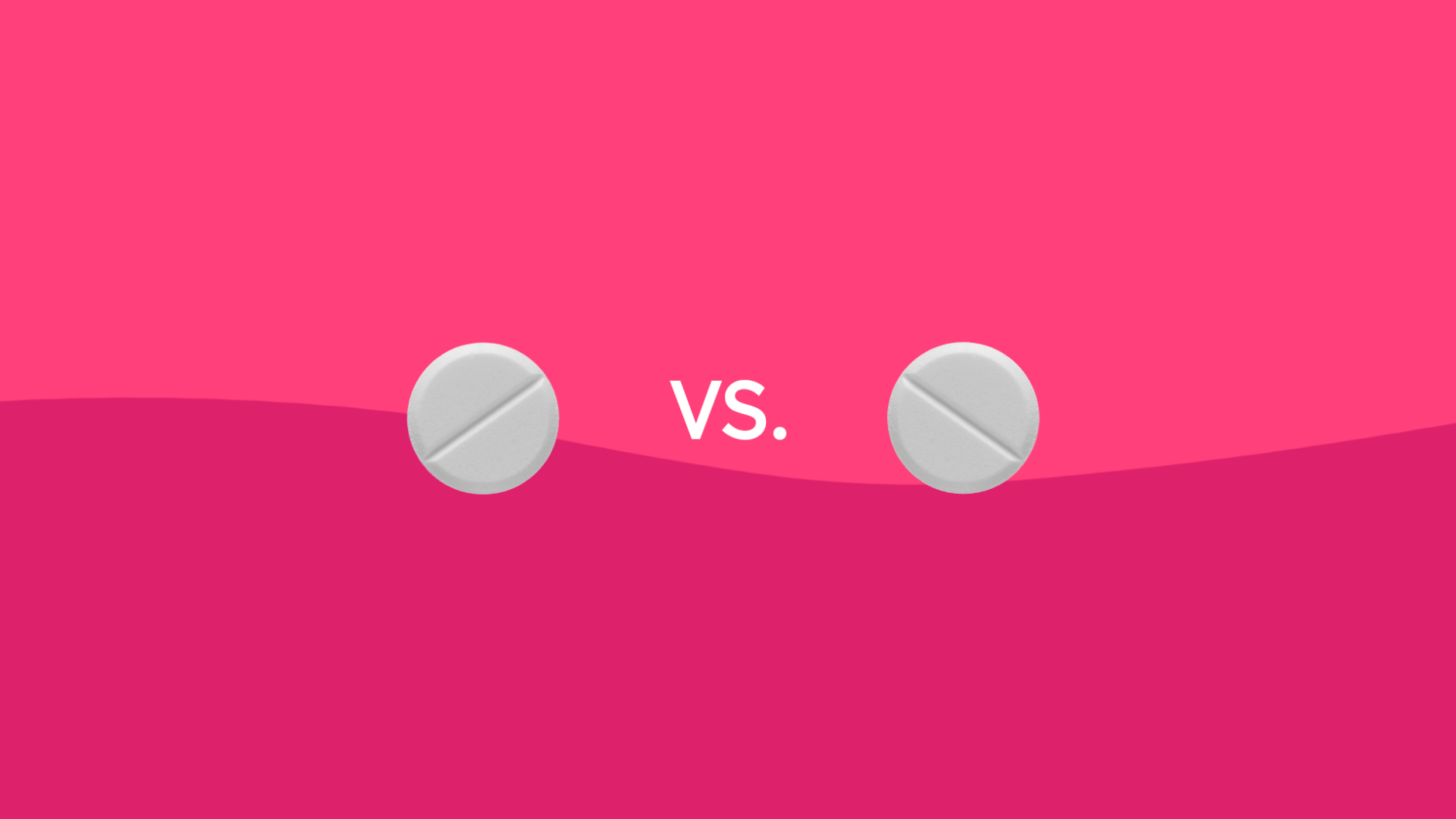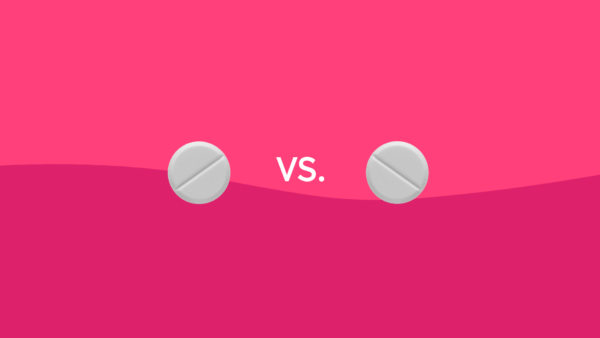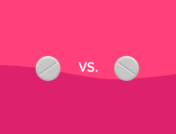Drug overview & main differences | Conditions treated | Efficacy | Insurance coverage and cost comparison | Side effects | Drug interactions | Warnings | FAQ
If you or your child has been diagnosed with ADHD (attention deficit hyperactivity disorder), a stimulant drug may be recommended to help relieve symptoms. Stimulant medications work by blocking the reuptake of dopamine and norepinephrine in the brain. As a result, these drugs help boost neurotransmitters that improve focus and alertness.
Adderall (amphetamine/dextroamphetamine) is a popular prescription drug that is available in different forms. Depending on your condition, your healthcare provider may prescribe Adderall or Adderall XR. Your doctor may also recommend behavioral therapy on top of prescription ADHD medications.
Both forms of Adderall contain the same active ingredients and work in much the same way. However, they have differences in formulations as well as how soon you’ll experience their effects and how long their effects last.
What are the main differences between Adderall and Adderall XR?
The main difference between Adderall and Adderall XR is that Adderall is an immediate-release drug and Adderall XR is an extended-release drug. This means that the active ingredients (d-amphetamine and l-amphetamine) are more slowly released over time from Adderall XR compared to Adderall.
Sometimes called Adderall IR, immediate-release Adderall needs to be taken multiple times per day whereas Adderall XR can be taken once daily. Effects may wear off sooner with Adderall versus Adderall XR, which has a more gradual effect throughout the day. The effects of Adderall last for around four to six hours while those of Adderall XR can last up to 12 hours.
It takes about seven hours for Adderall XR and around four hours for Adderall to reach maximum levels in the blood. In this way, some people may experience effects faster with Adderall than with Adderall XR. However, Adderall XR can be beneficial for some people who experience “crashing” with regular Adderall.
Another difference between Adderall and Adderall XR is that Adderall comes as an oral tablet while Adderall XR is available as an oral capsule. Adderall is available in strengths of 5 mg, 7.5 mg, 10 mg, 12.5 mg, 15 mg, 20 mg, and 30 mg. Adderall XR is available in strengths of 5 mg, 10 mg, 15 mg, 20 mg, 25 mg, and 30 mg.
| Main differences between Adderall and Adderall XR | ||
|---|---|---|
| Adderall | Adderall XR | |
| Drug class | CNS stimulant | CNS stimulant |
| Brand/generic status | Brand and generic version available | Brand and generic version available |
| What is the generic name? | Dextroamphetamine/amphetamine salts | Dextroamphetamine/amphetamine salts, extended-release |
| What form(s) does the drug come in? | Oral tablet | Oral capsule |
| What is the standard dosage? | 5 to 40 mg once in the morning and then every 4 to 6 hours as directed by a doctor | 5 to 30 mg once daily in the morning as directed by a doctor |
| How long is the typical treatment? | Adderall can be used on a short-term basis for 3 to 4 weeks. Long-term use needs to be regularly monitored by a doctor. | Adderall XR can be used on a short-term basis for 3 to 4 weeks. Long-term use needs to be regularly monitored by a doctor. |
| Who typically uses the medication? | Adults and children 3 years of age and older | Adults and children 6 years of age and older |
Want the best price on Adderall?
Sign up for Adderall price alerts and find out when the price changes!
Conditions treated by Adderall vs. Adderall XR
Both forms of Adderall are FDA-approved to treat ADHD. ADHD is a chronic mental disorder that can affect children, adolescents, and adults. The most common symptoms of ADHD include inattention, impulsiveness, and restlessness. As CNS (central nervous system) stimulants, Adderall can help balance brain chemicals to improve focus.
Adderall is also approved to treat narcolepsy, a sleep disorder that involves excessive daytime drowsiness and sudden sleep attacks. People with narcolepsy have disrupted sleep-wake cycles that can affect their daily work and social lives. Although Adderall XR is not usually prescribed for this purpose, Adderall IR can help alleviate these symptoms and improve wakefulness.
Off-label uses of Adderall may include treatment of depression and/or anxiety, especially in those who already have ADHD. Approximately 75% of adults with ADHD also have another condition. Some practitioners may prescribe the use of a stimulant with an antidepressant for treating both ADHD and depression. Other studies have found that stimulant medications like Adderall can also be effective for treating ADHD with anxiety.
| Condition | Adderall | Adderall XR |
| ADHD (attention deficit hyperactivity disorder) | Yes | Yes |
| Narcolepsy | Yes | Off-label |
| Depression, with ADHD | Off-label | Off-label |
| Anxiety, with ADHD | Off-label | Off-label |
Is Adderall or Adderall XR more effective?
Adderall and Adderall XR contain the same active ingredients that can help treat symptoms of ADHD. Because ADHD treatment is personalized toward your specific symptoms and response to drugs, either form of Adderall may work for you.
Some adults and children can forget to take their second dose of Adderall later in the day. This could result in effects dropping off throughout the day. Adderall XR has the advantage of once-daily dosing with effects that can last throughout the work or school day.
Adderall XR has good tolerability and may produce fewer adverse effects, especially in people with heart or blood pressure problems. Some studies have found that extended-release Adderall is useful for those with high blood pressure (hypertension). Adderall XR was also found to have long-term safety and effectiveness for treating ADHD.
Adderall XR capsules contain small beads of the drug. Some doctors instruct their patients to open the capsules and place the beads in soft foods like applesauce. For those who have trouble swallowing medication, Adderall XR can be an effective treatment option.
Whether you are prescribed Adderall or Adderall XR depends on your overall condition and symptoms. The dosing of these drugs is highly individualized and needs to be adjusted over time in some cases. Talk to your healthcare provider to discuss your potential treatment options.
Want the best price on Adderall XR?
Sign up for Adderall XR price alerts and find out when the price changes!
Coverage and cost comparison of Adderall vs. Adderall XR
Because Adderall is available in a generic form, most Medicare and insurance plans will not cover the brand name. However, the generic version contains the same ingredients and works in the same way. The average retail cost of Adderall tablets is around $252. If you use an Adderall savings card, you can save more and get generic Adderall for around $28 for 60 30 mg tablets.
If you have a prescription for Adderall XR, most Medicare and insurance plans will cover the generic version of it. Depending on which pharmacy you go to, the average retail cost can run up to $233. You can use an Adderall XR savings card to lower this cost and save much more. With a savings card from SingleCare, you can expect to pay around $24 instead.
| Adderall | Adderall XR | |
| Typically covered by insurance? | Yes (generic) | Yes (generic) |
| Typically covered by Medicare Part D? | Yes (generic) | Yes (generic) |
| Standard dosage | 30 mg tablets, quantity of 60 tablets | 30 mg capsules, quantity of 30 capsules |
| Typical Medicare Part D copay | $7–$78 | $7–$159 |
| SingleCare cost | $33 | $42 |
Common side effects of Adderall and Adderall XR
The most common side effects of Adderall are insomnia or trouble sleeping, dry mouth, loss of appetite, weight loss, nervousness or anxiety, and nausea. Compared to other ADHD medications like Ritalin (methylphenidate), amphetamines have a greater chance of decreasing appetite. Other side effects may include abdominal pain, diarrhea, agitation, dizziness, and headache.
Adderall and Adderall XR can also increase heart rate and blood pressure. These side effects may be more serious for those with preexisting heart or blood pressure problems.
| Adderall | Adderall XR | |||
| Side Effect | Applicable? | Frequency | Applicable? | Frequency |
| Insomnia | Yes | *not reported | Yes | 27% |
| Dry mouth | Yes | * | Yes | 35% |
| Loss of appetite | Yes | * | Yes | 33% |
| Nausea | Yes | * | Yes | 8% |
| Nervousness | Yes | * | Yes | 13% |
| Abdominal pain | Yes | * | Yes | 14% |
| Indigestion | Yes | * | Yes | 2% |
| Diarrhea | Yes | * | Yes | 6% |
| Headache | Yes | * | Yes | 26% |
| Dizziness | Yes | * | Yes | 7% |
This may not be a complete list of adverse effects that can occur. Please refer to your healthcare provider to learn more.
Source: DailyMed (Adderall), DailyMed (Adderall XR)
Drug interactions of Adderall vs. Adderall XR
Both forms of Adderall have similar drug interactions. Adderall and Adderall XR can interact with monoamine oxidase inhibitors (MAOIs), alkalinizing agents, and CYP2D6 inhibitors. Taking these drugs with Adderall can increase amphetamine levels in the blood and increase the risk of adverse effects.
Adderall and Adderall XR can also interact with acidifying agents, which can decrease the levels of amphetamine in the blood. Taking these drugs together may decrease the effects of Adderall.
Adderall and Adderall XR can decrease the effects of beta blockers and antihypertensives (blood pressure-lowering medications). This is because amphetamine produces stimulant effects that can increase blood pressure.
| Drug | Drug Class | Adderall | Adderall XR |
| Selegiline Isocarboxazid Phenelzine Linezolid |
Monoamine oxidase inhibitors (MAOIs) | Yes | Yes |
| Metoprolol Bisoprolol Atenolol Propranolol |
Beta blockers | Yes | Yes |
| Lisinopril Losartan Amlodipine Verapamil |
Antihypertensives | Yes | Yes |
| Sodium bicarbonate Acetazolamide |
Alkalinizing agents | Yes | Yes |
| Guanethidine Reserpine Ammonium chloride |
Acidifying agents | Yes | Yes |
| Paroxetine Fluoxetine Quinidine Ritonavir |
CYP2D6 inhibitors | Yes | Yes |
This is not a complete list of drug interactions. Please consult your healthcare provider before taking these medications.
Warnings of Adderall and Adderall XR
Adderall and Adderall XR are Schedule II controlled substances according to the DEA. This means that these medications have a high potential for drug abuse and dependence, especially when they’re not taken as prescribed. Adderall should only be taken with guidance from your healthcare provider.
People with a history of heart disease, heart abnormalities, or other heart problems, may have an increased risk of sudden death, heart attack, or stroke while taking CNS stimulants. Those with high blood pressure may be at risk of increased blood pressure while taking CNS stimulants.
Long-term Adderall has been shown to cause suppression of growth in some children. Children’s height and weight should be monitored regularly while taking Adderall products.
Taking Adderall or Adderall XR can worsen tics. If you or your child experiences tics or has Tourette’s syndrome, an alternative drug may be recommended.
Frequently asked questions about Adderall vs. Adderall XR
What is Adderall?
Adderall is a prescription medication used for the treatment of ADHD and narcolepsy. It is available in brand-name and generic forms as an immediate-release tablet. Adderall is usually taken every four to six hours to treat ADHD symptoms.
What is Adderall XR?
Adderall XR is a brand-name drug that contains a mixture of amphetamine salts. It is FDA-approved to treat ADHD in adults, adolescents, and children. Adderall XR is the extended-release form of Adderall that can be taken once daily.
Are Adderall and Adderall XR the same?
Adderall and Adderall XR both contain a combination of amphetamine salts. However, they are not the same drug. Adderall is an immediate-release drug and Adderall XR is an extended-release drug.
Is Adderall or Adderall XR better?
The most effective form of Adderall is the one that works best for you. Adderall is taken multiple times throughout the day while Adderall XR is taken as a daily dose. Adderall XR tends to have more long-acting effects compared to Adderall.
Can I use Adderall or Adderall XR while pregnant?
Adderall and Adderall XR are not generally recommended for women who are pregnant. There is a possibility that these stimulants can cause birth defects. Talk to your healthcare provider about ADHD treatment options while pregnant.
Can I use Adderall or Adderall XR with alcohol?
It is not recommended to mix Adderall or Adderall XR with alcohol. Adderall is a CNS stimulant while alcohol acts as a CNS depressant. Mixing these substances can increase the incidence of adverse effects.
Is Adderall extended release more expensive?
The cost of Adderall depends on the dose you are prescribed, your insurance plan, and the quantity you need. In general, generic forms of Adderall and Adderall XR can be found for reasonable prices, especially with a SingleCare discount card.
Is Adderall or Vyvanse stronger?
Adderall and Vyvanse are both effective drugs to treat ADHD. Adderall XR and Vyvanse are long-acting stimulants that can be taken once daily. Vyvanse can also treat binge-eating disorder.
What can I take instead of Adderall?
You have several treatment options for ADHD. Instead of Adderall, your healthcare provider may recommend another stimulant such as Dexedrine (dextroamphetamine), Focalin (dexmethylphenidate), or Ritalin/Concerta (methylphenidate ER). Non-stimulant drugs like Strattera (atomoxetine) are also effective for ADHD.
Sources
- Dextroamphetamine-Amphetamine, StatPearls (2023)
- Narcolepsy, National Institute of Neurological Disorders and Stroke (2023)
- Treatment of adults with attention-deficit/hyperactivity disorder, Neuropsychiatric Disease and Treatment (2008)
- An open-label study of the tolerability of mixed amphetamine salts in adults with attention-deficit/hyperactivity disorder and treated primary essential hypertension, Journal of Clinical Psychiatry (2006)
- Long-term safety and effectiveness of mixed amphetamine salts extended release in adults with ADHD, CNS Spectrums (2005)
- A Review of Pharmacological Management of Attention-Deficit/Hyperactivity Disorder, The Journal of Pediatric Pharmacology and Therapeutics (2016)
- Dextroamphetamine and Amphetamine, National Library of Medicine (2019)
- The effects of long-term medication on growth in children and adolescents with ADHD: an observational study of a large cohort of real-life patients, Child and Adolescent Psychiatry and Mental Health (2015)
- Tourette Syndrome, National Institute of Neurological Disorders and Stroke (2023)
- Adderall label, AccessFDA
- Increasing Use of ADHD Medications in Pregnancy, Pharmacoepidemiology and Drug Safety (2016)





